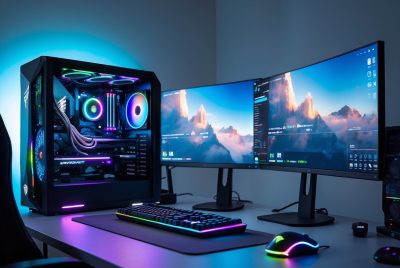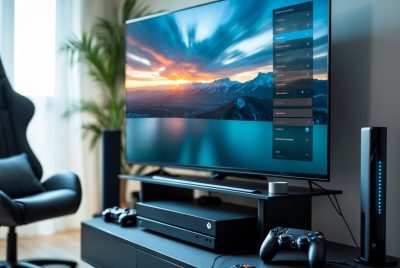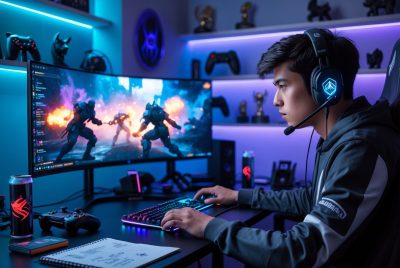Best DNS Server for Gaming: Boost Your Online Play
*We may earn a commission for purchases made using our links. Please see our disclosure to learn more.
Best DNS Server for Gaming: Boost Your Online Play with Top Picks
So what is the best DNS server for gaming? Let’s find out! In the realm of online gaming, the choice of a Domain Name System (DNS) can be as impactful on performance as the hardware running the game. As players demand quicker response times and a stable connection, optimizing every aspect of their network becomes crucial. I understand that DNS servers do more than just translate domain names to IP addresses; they can significantly affect gaming experience by potentially reducing latency, improving connection stability, and providing robust security features.

From my perspective, it’s not just about speed. When evaluating the best DNS servers for gaming, one needs to consider various factors including lookup speed, security measures, and privacy protection. DNS servers like Cloudflare, Google Public DNS, and Quad9 provide fast and secure internet connections, which can enhance gaming by offering a more responsive and uninterrupted experience. Security is especially important in gaming to prevent attacks such as Distributed Denial of Service (DDoS), which can be mitigated by reliable DNS providers.
Moreover, many gamers are now looking towards DNS options that offer additional privacy. This is where servers like NextDNS come into play, offering customization and filtering controls that can block unwanted content and keep gaming activities private. My interactions with these services have shown that a good gaming DNS doesn’t just direct traffic – it shapes the entire online experience, serving as a gateway to both performance gains and enhanced personal data protection.
Understanding DNS and Its Impact on Gaming

DNS, short for Domain Name System, functions like a phonebook for the internet. It translates human-friendly domain names into numerical IP addresses that computers use to identify each other on the network. When I’m gaming, every millisecond counts, and DNS can affect this delicate timing.
Efficient DNS servers have the potential to improve my gaming experience by reducing latency and providing quicker responses to my game server requests. Here’s how DNS impacts gaming:
- Latency Reduction: A faster DNS server can find the IP address quicker for the game I’m connecting to, which can slightly reduce latency.
- Reliability: A reliable DNS server ensures that my gaming sessions are not interrupted due to failed domain name resolutions.
- Security: Some DNS servers offer additional security features to protect me against phishing and other malicious activities during my gaming sessions.
I should consider these factors when choosing a DNS server for gaming:
- Speed: Look for servers with a low average lookup time.
- Uptime: A DNS with a high uptime percentage is less likely to go down.
- Security: Enhanced security features can protect from cyber threats.
Here’s a list of commonly mentioned DNS servers and their attributes:
| DNS Provider | Speed | Uptime | Security Features |
| Cloudflare | Fast | High | Privacy-focused; no logging |
| Google Public DNS | Fast | High | Built-in security measures |
| Quad9 | Decent | High | Blocks malicious domains |
Different servers might work better or worse depending on one’s location and ISP, so it’s important I test them personally to see which performs best for my situation.
Identifying the Best DNS Servers for Gaming

When selecting DNS servers for gaming, the primary factors I consider are ping, latency, and the response time of the DNS resolver. A fast connection to game servers is crucial and can be assisted by a reliable DNS server, potentially reducing the delay experienced during online gaming.
- Cloudflare DNS impresses with its speed and privacy focus. It commonly offers 1.1.1.1 as the primary DNS and 1.0.0.1 as secondary. Cloudflare’s servers are optimized for quick responses, which is essential when I seek minimal delay in games.
- Google Public DNS, known for its robust infrastructure, is another top choice with addresses 8.8.8.8 and 8.8.4.4. I’ve found it to be reliable with consistent speeds, which is beneficial for gaming across various platforms including Windows, Android, iOS, Linux, and game consoles.
- Quad9 DNS stands out for security by blocking malicious domains. It uses the addresses 9.9.9.9 and 149.112.112.112, with extensive server locations aiding in fast response times.
- OpenDNS offers customization options which is great for filtering content, and it has been known for its reliability and speed using 208.67.222.222 and 208.67.220.220 as DNS servers.
When I choose a DNS server, I make sure to consider the server location relative to my geographic location to ensure the best possible gaming experience. By prioritizing low latency, minimal ping, and quick DNS query resolutions, I ensure that my online gaming sessions are as responsive and uninterrupted as possible.
Key Features and Considerations

When choosing the best DNS server for gaming, it’s critical to assess key features that directly affect your online gaming experience. These include speed, security, reliability, and additional functionalities that cater to diverse needs and preferences.
Speed and Performance
- Lookup Speed: The time it takes for the DNS server to convert domain names into IP addresses can impact game start times and overall responsiveness.
- Connection Speeds: I consider both download and upload speeds since a fast connection improves game performance, while low jitter ensures smooth gameplay.
Security and Privacy
- Security Features: DNS servers with robust security features, such as malware scanning and protection against DNS spoofing, provide a safer gaming environment.
- Privacy: A strong privacy policy is important to me as it helps in preventing my data from being sold or used for targeted advertising. Support for encryption protocols like DNS over HTTPS (DoH) or DNS over TLS (DoT) can shield my queries from eavesdropping.
Reliability and Support
- Reliable Connection: For online gamers, consistent uptime and minimal outages are a must. An SLA (Service Level Agreement) can guarantee certain levels of performance.
- Customer Support: Quick and helpful support can be crucial when facing connection issues or technical difficulties.
Additional Functionality
- Flexibility: Options such as support for IPv6, smart DNS, or customizable filtering cater to gamers who need versatility in managing their internet experience.
- Content Filtering: Parental controls and content filtering options help me control my network’s access to various internet content, adding a layer of protection against unsuitable material.
Choosing the right DNS server for gaming means considering these important factors to enhance my gaming sessions with a reliable, secure, and fast internet connection.
Optimizing Gaming Experience with DNS Configuration

Configuring your DNS (Domain Name System) settings can significantly improve online gaming by reducing lag and loading times. A well-chosen DNS resolver can also enhance security against DDoS attacks and other online threats.
Platform-Specific DNS Settings
Windows, Xbox, Android, iOS, Linux:
- Each platform allows custom DNS settings, and I manage them as follows:
- Windows: I navigate to
Control Panel > Network and Internet > Network and Sharing Center > Change adapter settingsto set my DNS. - Xbox: Within the
Network settings, I selectAdvanced settingsto change my DNS. - Android: Under
Wi-Fi, I tap the network I’m connected to, then selectAdvanced, and change theIP settingsto ‘Static’ to set my DNS. - iOS: In the
Wi-Fisettings, by clicking the ‘i’ icon next to the network, I can configure the DNS settings. - Linux: I typically edit the
resolv.conffile or use the network manager GUI to set my DNS servers.
- Windows: I navigate to
By customizing my DNS, I can minimize issues such as high ping and packet loss which are often caused by a slow or congested default resolver.
Troubleshooting DNS Issues for Gamers
Common DNS-Related Problems:
- High ping and lagging often indicate DNS issues particularly if my internet connection is otherwise stable.
- Packet loss can occur when DNS queries are delayed or lost due to network congestion or misconfigured resolvers.
- I ensure that I’m not on a censored network which can restrict DNS queries and lead to performance issues.
Steps to Resolve DNS Problems:
- I perform regular speed tests and ping tests to various servers to identify if lag is pertaining to DNS.
- Changing my DNS resolver can mitigate issues, and I often choose servers that are geared towards online gaming.
- To protect against viruses and hackers, I opt for DNS servers with built-in security features.
- If I suspect DDoS attacks, I select a DNS provider that is known for its ability to handle large amounts of traffic and filter attacks.
- Regularly updating my devices ensures the latest network protocols and DNS standards are in place.
Through these methods, I successfully manage to maintain an optimal gaming experience by dealing with DNS-specific problems.
Frequently Asked Questions
In this section, I’ll cover the most common inquiries gamers have about DNS servers and how they influence gaming performance.
1. What benefits can gamers expect from choosing a specialized DNS?
Gamers can expect reduced latency and potential improvements in connection stability when using a DNS optimized for gaming. These servers are typically designed to handle high traffic volumes and prioritize speed.
2. How does DNS affect gaming performance, particularly in terms of ping and latency?
DNS can affect gaming performance by determining how quickly a game can connect to the server. A faster DNS may reduce the initial connection time, potentially resulting in lower ping and latency during gameplay.
3. What considerations should be made when selecting a DNS server for console gaming on platforms like Xbox or PS5?
When selecting a DNS server for console gaming, consider the server location in relation to your own, the provider’s uptime record, and whether it offers any gaming-specific optimizations.
4. How do Cloudflare and similar DNS services improve online gaming experiences?
Cloudflare and similar DNS services provide faster resolution times and potentially more reliable routing to game servers, which can reduce lag and improve the overall gaming experience.
5. Between popular DNS options such as 1.1.1.1 and 8.8.8.8, which is typically more reliable for gaming?
The reliability of DNS servers like 1.1.1.1 (Cloudflare) and 8.8.8.8 (Google DNS) can vary based on location and network conditions. Generally, Cloudflare’s 1.1.1.1 is praised for its privacy and speed, which can be beneficial for gaming.




